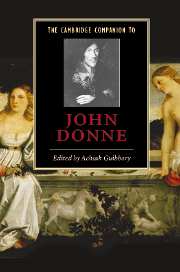Book contents
- Frontmatter
- 1 Donne’s life: a sketch
- 2 The text of Donne’s writings
- 3 The social context and nature of Donne’s writing: occasional verse and letters
- 4 Literary contexts: predecessors and contemporaries
- 5 Donne’s religious world
- 6 Donne’s political world
- 7 Reading and rereading Donne’s poetry
- 8 Satirical writing: Donne in shadows
- 9 Erotic poetry
- 10 Devotional writing
- 11 Donne as preacher
- 12 Donne’s language: the conditions of communication
- 13 Gender matters: the women in Donne’s poems
- 14 Facing death
- 15 Donne’s afterlife
- 16 Feeling thought: Donne and the embodied mind
- Select bibliography
- Index
- Series List
4 - Literary contexts: predecessors and contemporaries
Published online by Cambridge University Press: 28 November 2006
- Frontmatter
- 1 Donne’s life: a sketch
- 2 The text of Donne’s writings
- 3 The social context and nature of Donne’s writing: occasional verse and letters
- 4 Literary contexts: predecessors and contemporaries
- 5 Donne’s religious world
- 6 Donne’s political world
- 7 Reading and rereading Donne’s poetry
- 8 Satirical writing: Donne in shadows
- 9 Erotic poetry
- 10 Devotional writing
- 11 Donne as preacher
- 12 Donne’s language: the conditions of communication
- 13 Gender matters: the women in Donne’s poems
- 14 Facing death
- 15 Donne’s afterlife
- 16 Feeling thought: Donne and the embodied mind
- Select bibliography
- Index
- Series List
Summary
In his search for poetic inspiration, Donne seems to have paid close attention to two distinct, albeit inter-related, bodies of poetry: the work produced in the years after the end of the Roman republic and the establishment of the empire, and the poetry written by his immediate contemporaries in London. In doing so he styles himself as a metropolitan poet, making a link between the greatest city of the ancient world on the cusp of its expansion and assumption of world domination, and a similar situation in contemporary England. Donne had direct experience of English maritime power, sailing on the Cadiz voyage under Essex and Raleigh (June-August 1596), and the ''Islands'' voyage to the Azores (July-October 1597), during which he wrote ''The Storme'' and ''The Calme.'' He later applied for the position of secretary of the Virginia Company (1609), and, had he been successful, would probably have sailed with Sir Thomas Gates in June of that year and suffered shipwreck on the Bermudas, an event that helped inspire Shakespeare to write The Tempest.
- Type
- Chapter
- Information
- The Cambridge Companion to John Donne , pp. 49 - 64Publisher: Cambridge University PressPrint publication year: 2006
- 1
- Cited by



